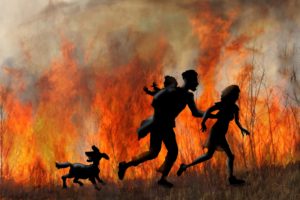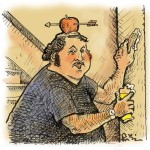Haim Watzman

Orit races to Yoel’s room as Adam pulls on his pants and tries to think whether there are any essential papers or valuables he should stuff into the pockets of his cargoes. Another tree catches, closer to home; a carpet of flame approaches from the edge of the back lawn, along the wadi. He has a coughing fit as Orit runs back in to the room, two-year-old Yoel swaddled in a wet blanket. She pulls at Adam. Shouldn’t there be screams, shouts, from the neighbors, he wonders as he coughs. Gandhi trails them, looking back at the window, and Yoel chants “Go way fire. Bad fire!”
When they emerge from their front door, Yoel exults: “Firetruck!” They stand on a peninsula, an enclave of houses surrounded on three sides by flames. Five firemen in yellow suits are hosing the trees and gaping at them.
“What the hell!” one exclaims, dropping his grip and running over. “Where have you been? We evacuated the whole street nearly an hour ago!”
Orit hugs Yoel close. “We were sleeping. No one woke us up.” The heat was almost unbearable but Adam could feel the cold of the November ground welling up through the soles of his sandals.
“Run for it!” the fireman shouts. “The way is clear straight up to the mansion. Don’t go right or left.”
Adam takes Yoel from Orit. They sprint up the hill to the other side of the moshav, where the stone mansion of Tanayev, the chairman of the Regional Council, lords over the landscape. It’s the only house in the village that was not made out of plaster and asbestos fiber. Orit chokes. Adam pushes her forward. He looks back. The flames have not reached their house, but the one across the street is ablaze. Asbestos, Adam thinks. That’s what we’re breathing now. The streets are empty and the light dances and changes colors. The street lamps are out and the only illumination comes from the fire itself.
“What if we hadn’t woken up?” Orit gasps beside him. He pushes her, like in the army, when a buddy loses strength and can’t keep up.
At the mansion, policemen are barring people from running back to their houses. Everyone seems to have forgotten something important. They pass Orit’s father, ashen-faced, sitting on the floor by the staircase. “They told me you were already here,” he mumbles, and mumbled it again.
Aaron, Orit’s brother, takes them up the staircase to the huge balcony terrace that looks out over the hills to the west of Jerusalem. Gandhi trots behind them, his head down.
“Go away, flames,” Yoel shouts, holding out both hands to push them away. Orit begins to cry. A ring of fire circles the moshav.
“We’re trapped,” Aaron says. “They can’t get us out. The firefighters are trying to open the road.” He turns to Orit. “Don’t talk to Abba. He went to get you but the firefighters told him that they’d gotten everyone out of the house. When he saw you weren’t here he fought the firemen but they wouldn’t let him go back.”
Gandhi begins to bay at the fire, a long, low trumpeting, as if he is calling for help from another world.
*
“I don’t give a shit. Get him up anyway. This is a battle zone.” The lieutenant, pauses for a second by the medic in the midst of barking orders to his men, runs over to where two of the guys are holding the Arab kid they’d captured in the wadi below the moshav. The soldiers, their faces black with soot as if they had put on camouflage, are at the gate, ranged around the truck that brought them here at 3 a.m. They are preparing to move out as soon as they get the okay from the firefighters.
Arnon opens his stretcher and places it next to Michael. With a swiftness that grows of much practice, he unbuckles the soldier’s vest and other gear. Michael is limp, puts up no resistance, so it’s no problem to ease him onto the open stretcher. He shivers in the cold, though. Arnon covers him with a blanket and puts another folded one under his head. Then he rips open a saline pack with his teeth and hooks it up to Michael’s arm. He is about to call over some guys to help get the stretcher in the truck when Michael sits up, suddenly and violently.
Michael surveys the flames and the smoke and raised his hands above his shoulders, as if he is worshipping them. He tries to get up on his feet but has no strength, so he dances, sitting on his ass, like a football forward who has just made a goal.
“I lit the fire! I lit the fire! I lit the fire!” he chants.
Arnon pushes him. “You’re crazy. Lie down.”
“What the fuck’s going on?” the lieutenant shouts.
“Michael’s gone bonkers,” Arnon shouts back, readying a syringe. Michael is trying to crawl off the stretcher, his eyes fixed on the flames in the wadi below.
Arnon grabs Michael’s arm and inserts his needle. The soldier looks down at his arm, smiles angelically at the medic, makes one more attempt to crawl off the stretcher and into the fire, and then collapses. The lieutenant has already sent four guys over. They lift the stretcher and Arnon holds the saline bag above the crazy boy as they carry him to the truck.
*
As he thinks this he realizes how ridiculous, and how hopeless, it is. He knows what is going to happen now. He’ll be punched, tied up, denied sleep, interrogated, put on trial, and sent to prison, and when he gets out, a year from now, three years, whenever, the other guys in the village will treat him like trash, not like the hero he set out to be. Because they’d all know that the fire had been started by the soldier on the stretcher and not by him. He’s a failure. The gasoline and sticks and matches are still in his backpack, which the soldiers have taken away from him. How had they spotted him? There were things in the air, planes and maybe some sort of robot. They have things that see at night. Some flying robot had sent his picture to a screen in some intelligence center and gotten his coordinates and sent the soldiers right to where he was, about to unload the pack and start the fire.
It’s not fair that he has to go through all this and still be an ahbal like he’d always been, not a hero who drove the Jews from the village they’d built on Arab land after the Nakba, using the best weapon the resistance has, fire, fire that would burn down the trees they planted and burn the Jews off the landscape. He can’t even light a forest fire on a dry windy winter day. That’s the kind of ahbal he is and he’ll always be. But if he can convince the soldier not to tell anyone that what had started the fire was the flare that the soldier launched with his mortar, the flare that made night day and made him so easy for the soldiers to chase him down (they should have shot him, that would have been better), then maybe it would be ok. But Walid knows that he’s just as crazy as the soldier, there on the ground. Anyway, all the soldiers know now. The soldier s shouting something. But the village is burning. Isn’t that enough? Isn’t that the point? But not because of him. The fire is green, Walid notices. Why is it green? Is that the way it is supposed to be?
A solder jumps off the truck, grabs his chin, looks into his eyes with hatred, slaps him hard, and then goes back to the truck. Just to get it out of his system. An old man is wandering among the soldiers. They yell at him to go back.
Arnon hears a sound that he first thinks is a siren. Then he realizes that it’s a dog, a dog baying. But no moon can be seen through the smoke.
“I left them to die,” the old man shouts at the soldiers. “Shoot me. I want you to shoot me.” He lifts his face to the smoke-obscured heavens. “I left them to die!”
A young man approaches at a run and comes up to the old man. Panting, he gently puts his arm around the old man’s shoulder.
“Come, Abba. Come back.”
“Who is it?” the old man asks, his eyes still directed skyward.
“It’s Aharon. Come back. Everyone is safe. Soon they’ll open the road and we can leave.”
The old man looks into the eyes of his son. “But there will be nothing to come back to.”
The lieutenant, standing by the cabin of the truck with the radio receiver to his ear, shouts to his men: “All clear. The road’s clear. Everyone onto the truck. We’re heading out.”
Soldiers roughly hoist Walid up to the truck and pushes him onto a bench, right next to Arnon, who is holding Michael’s wrist and taking his pulse.
Michael stirs and, in his slumber, murmured “I lit the fire!”
Walid nods glumly and waits to be beaten.
^^^^^^^^^^^^^^^^^^^^^^^^^^^^^^^^^^^^^^^
 Read more Necessary Stories!
Read more Necessary Stories!
Receive email alerts of new Necessary Stories every month, and other pieces by Haim:
.





